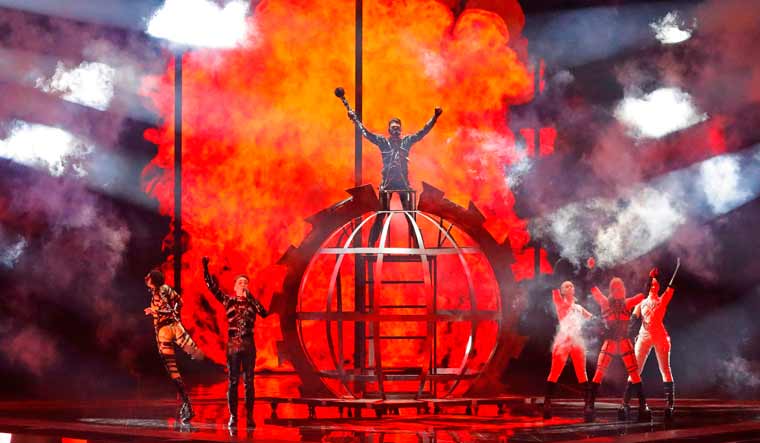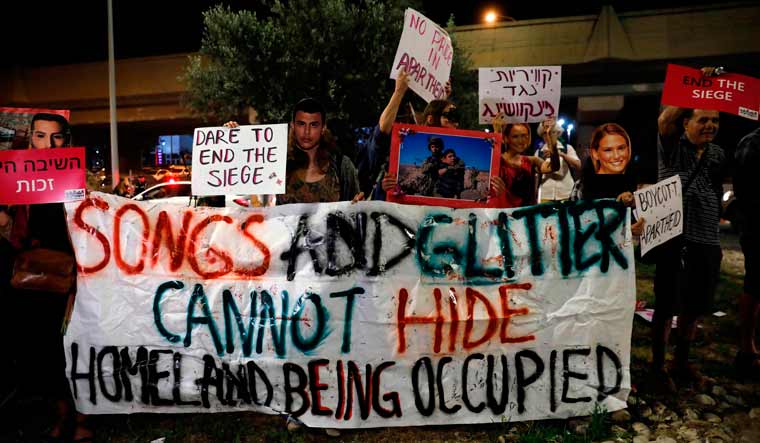As the presenters of Eurovision 2019 announced Iceland’s score during the semi-finals, the camera zooms in towards the leather-and-spikes-toting band that had, in hindsight, already announced their intent to politicize the contest.
The black, white, and green of the Palestinian flag fills the frame. A clearly confused camera operator then zooms out, revealing all the members of Hatari bearing the banners to a Tel Aviv audience — a performative protest against the host nation of this year’s Eurovision, Israel. The audience response was a mixed medley of cheers and boos. The mistake was swiftly realised by the broadcasters, who swiftly cut to the anchors announcing France’s score.

Hatari took Iceland to the tenth position of this year’s Eurovision, the international “European” song contest that has over the years come to accept both Israel and Australia into its fold. Describing themselves as an “anti-capitalist, BDSM, techno-dystopian, performance art collective,” the band enjoys a biting sense of irony.
Hatari’s official bio on the Eurovision websites announces that the group is “brought to you almost exclusively by premier, top quality, Icelandic effervescent soft drink manufacturer Soda Dream.” While this corporate plug may seem antithetical to the group’s anti-capitalist intentions, it is itself an act of satire — a play on the Israel-based company Soda Stream, which carbonates water for multinationals like PepsiCo.
Soda Dream’s website states in an artistic font: “We know pure water is a scarce resource, which is why we started carbonating, bottling, and exporting the pristine Hálslón lake of East Iceland.” It is a not-subtle jab at Soda Stream’s controversial manufacturing plant in the West Bank, which has been a target of the Boycott, Divestment and Sanctions (BDS) movement.
EBU: "Eurovision is not a political event, please do not endorse any political messages"
— Mia ✨ (@miadelkay) May 19, 2019
Hatari: NANA BANANA I DO WHAT I WANNA pic.twitter.com/Qo9t0KKuNr
Hatari's act was taken up by Twitter users with gusto.
This is the third time that Eurovision has been hosted in Israel — the previous occasions took place in 1979 and 1999. Despite the show having a history in Israel, this may well prove to be the most politicized Eurovision yet.
Hatari were not the only ones to protest at the event. Pop superstar Madonna flaunted the Palestinian flag on the back of her dress, as did her backup dancers. During the show’s first semi-final, hackers managed to briefly interrupt the stream to display the message “Risk of Missile Attack, Please take shelter.”
While these protests generated significant buzz, they were not wholly appreciated even by supporters of BDS. One of the movement’s founding members, the Palestinian Campaign for the Academic and Cultural Boycott of Israel (PACBI), decried both Hatari and Madonna on Twitter. PACBI argues that if Hatari or Madonna truly supported BDS, they would have stuck by the first letter in its abbreviation and boycotted the event entirely.
Palestinian civil society overwhelmingly rejects fig-leaf gestures of solidarity from international artists crossing our peaceful picket line #Hatari #BoycottEurovision2019 #ESC2019 #Eurovision2019 #esf19 #EurovisionSongContest #DareToDreamTogether #DareToDream #Eurovision pic.twitter.com/IP5MaTfQrQ
— PACBI (@PACBI) May 18, 2019
Of Madonna, the chapter tweeted that “entertaining apartheid Tel Aviv for $1M serves an immoral political agenda,” while on Hatari, they said they rejected the “fig-leaf gestures of solidarity from international artists crossing our peaceful picket line.”
The European Broadcaster’s Union (EBU), which supervises Eurovision, have promised to discuss the “consequences” of Hatari’s actions. Under the EBU’s rules, artists may not promote political causes at Eurovision, facing the threat of disqualification when they do so.
Against the backdrop of all this was Netherland’s victory at the contest — courtesy a heart-winning performance by Duncan Laurence of the song ‘Arcade’. The question that remains is over what audiences will remember from Eurovision 2019 — the music or the controversy?



